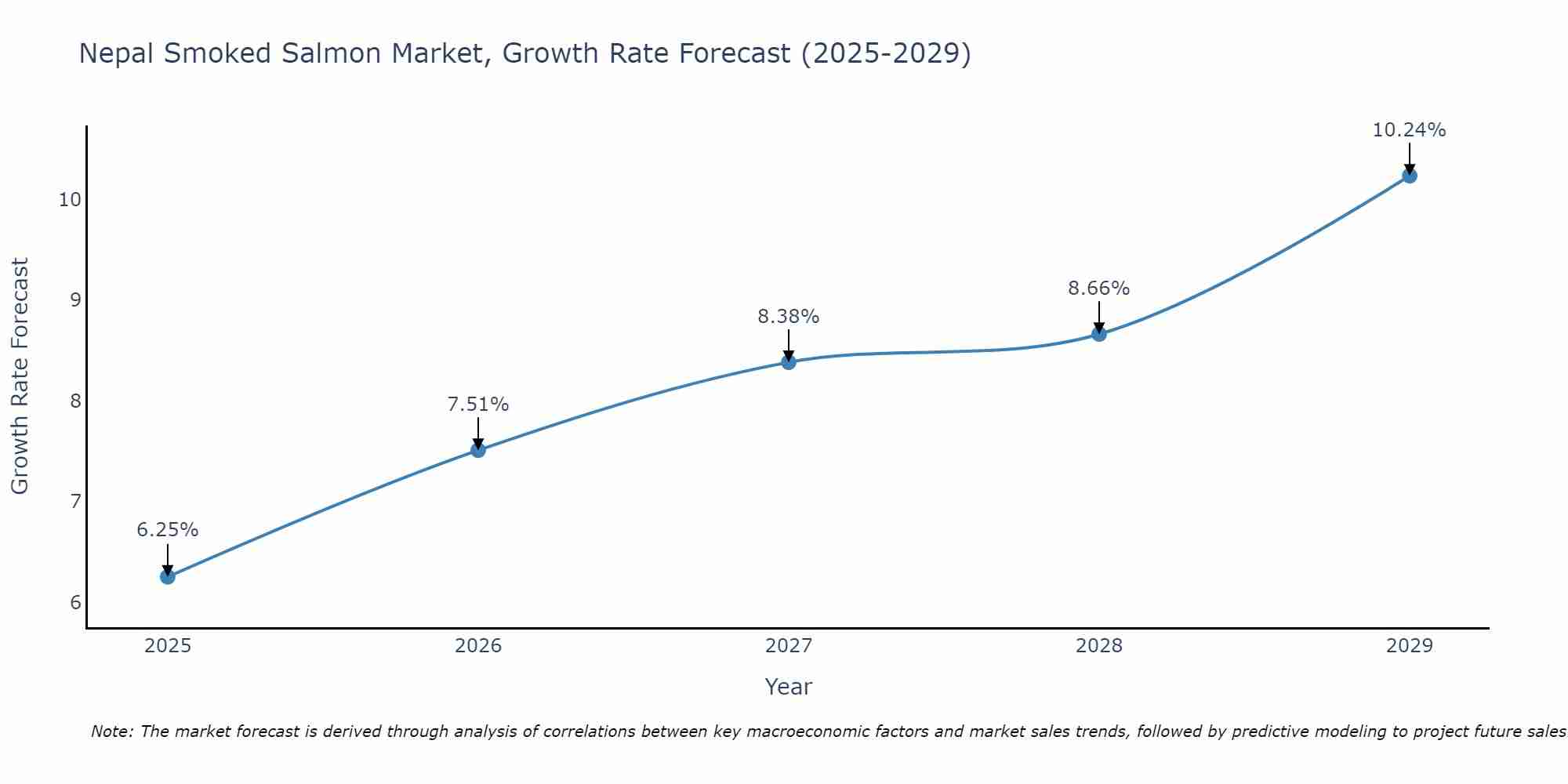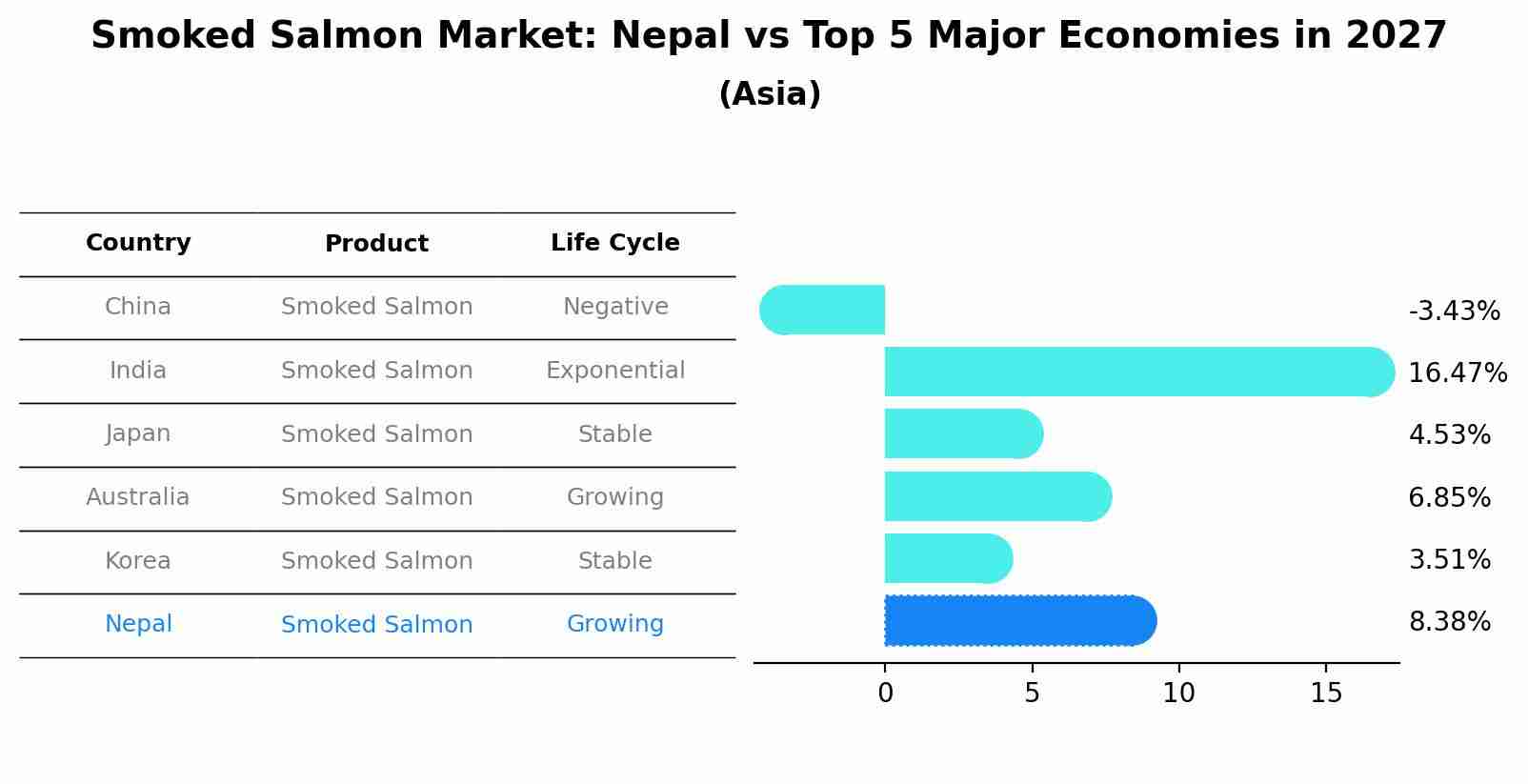Nepal Smoked Salmon Market (2025-2031) Outlook | Companies, Revenue, Share, Growth, Industry, Analysis, Forecast, Value, Size, Trends
| Product Code: ETC387876 | Publication Date: Aug 2022 | Updated Date: Jul 2025 | Product Type: Market Research Report | |
| Publisher: 6Wresearch | Author: Shubham Deep | No. of Pages: 75 | No. of Figures: 35 | No. of Tables: 20 |
Nepal Smoked Salmon Market Size Growth Rate
The Nepal Smoked Salmon Market is poised for steady growth rate improvements from 2025 to 2029. From 6.25% in 2025, the growth rate steadily ascends to 10.24% in 2029.

Smoked Salmon Market: Nepal vs Top 5 Major Economies in 2027 (Asia)
In the Asia region, the Smoked Salmon market in Nepal is projected to expand at a growing growth rate of 8.38% by 2027. The largest economy is China, followed by India, Japan, Australia and South Korea.

Nepal Smoked Salmon Market Synopsis
The Nepal Smoked Salmon market is a niche segment within the country`s seafood industry, characterized by a growing demand for high-quality smoked salmon products among urban consumers. While traditionally not a staple in Nepalese cuisine, smoked salmon has gained popularity as a gourmet food item, often consumed as a delicacy or used in fusion dishes in upscale restaurants and hotels. The market is primarily driven by the rising disposable income levels, changing dietary preferences, and increasing awareness about the health benefits of consuming seafood rich in omega-3 fatty acids. Key players in the Nepal Smoked Salmon market focus on product innovation, premium quality offerings, and strategic distribution channels to cater to the evolving tastes of consumers looking for exotic and healthy food options. Despite its relatively small size, the market shows potential for further growth and diversification in the coming years.
Nepal Smoked Salmon Market Trends
The Nepal Smoked Salmon market is witnessing a growing demand for high-quality, sustainably sourced products. Consumers are increasingly seeking out smoked salmon as a premium protein option, driven by a rising interest in healthy and gourmet foods. There is also a noticeable trend towards convenience, with ready-to-eat smoked salmon products gaining popularity among busy urban consumers. In addition, there is a growing awareness of the health benefits of omega-3 fatty acids found in salmon, further boosting its appeal. As the market continues to evolve, there is a focus on product innovation and diversification, with flavors and packaging playing a key role in attracting consumers. Overall, the Nepal Smoked Salmon market is poised for steady growth as consumers prioritize quality, convenience, and health-conscious choices in their food purchases.
Nepal Smoked Salmon Market Challenges
In the Nepal Smoked Salmon Market, some key challenges include limited consumer awareness and appreciation for smoked salmon as a premium product due to traditional preferences for fresh fish. Additionally, logistical issues related to sourcing quality salmon, maintaining cold chain integrity, and ensuring timely delivery in a landlocked country like Nepal can pose significant hurdles for suppliers and distributors. Furthermore, the high import costs of salmon can make pricing less competitive compared to locally sourced fish products, limiting market penetration. To succeed in this market, companies need to invest in educating consumers about the value and benefits of smoked salmon, streamline supply chain operations, and potentially explore partnerships for cost-effective sourcing to overcome these challenges and capitalize on the growing demand for premium seafood products in Nepal.
Nepal Smoked Salmon Market Investment Opportunities
The Nepal smoked salmon market presents promising investment opportunities due to the increasing demand for premium seafood products among the country`s affluent population. The growing awareness of the health benefits associated with consuming salmon, coupled with the rising trend of gourmet dining and international culinary influences, are driving the market`s growth. Investors can explore opportunities in establishing or partnering with local producers to develop high-quality smoked salmon products tailored to the preferences of Nepali consumers. Additionally, there is potential for exporting Nepali smoked salmon to international markets, leveraging the country`s reputation for natural and sustainable food products. Investing in this niche market segment can offer attractive returns as the demand for premium seafood continues to rise in Nepal.
Jordan Agar Market Government Policies
The Nepalese government has implemented various policies to regulate the Smoked Salmon Market in the country. These policies include ensuring compliance with food safety standards and regulations, monitoring the quality of smoked salmon products to protect consumer health, and promoting sustainable practices in the production and distribution of smoked salmon. Additionally, the government has introduced initiatives to support local producers and promote the growth of the industry through incentives and subsidies. Overall, the government`s policies aim to create a competitive and transparent market environment for smoked salmon in Nepal while safeguarding consumer interests and promoting sustainable development in the sector.
Nepal Smoked Salmon Market Future Outlook
The Nepal smoked salmon market is expected to experience steady growth in the coming years due to increasing consumer demand for premium and gourmet food products. Factors such as rising disposable incomes, changing dietary preferences, and a growing interest in healthy and exotic food options are driving the market expansion. Additionally, the trend towards convenience and ready-to-eat seafood products is likely to further boost the demand for smoked salmon in Nepal. As the market continues to evolve, producers are expected to focus on introducing innovative flavors and packaging formats to cater to the diverse preferences of consumers. Overall, the future outlook for the Nepal smoked salmon market appears positive, with opportunities for growth and development in the premium seafood segment.
Key Highlights of the Report:
- Nepal Smoked Salmon Market Outlook
- Market Size of Nepal Smoked Salmon Market, 2024
- Forecast of Nepal Smoked Salmon Market, 2031
- Historical Data and Forecast of Nepal Smoked Salmon Revenues & Volume for the Period 2021 - 2031
- Nepal Smoked Salmon Market Trend Evolution
- Nepal Smoked Salmon Market Drivers and Challenges
- Nepal Smoked Salmon Price Trends
- Nepal Smoked Salmon Porter's Five Forces
- Nepal Smoked Salmon Industry Life Cycle
- Historical Data and Forecast of Nepal Smoked Salmon Market Revenues & Volume By Type for the Period 2021 - 2031
- Historical Data and Forecast of Nepal Smoked Salmon Market Revenues & Volume By Vac/Vacuum Packing for the Period 2021 - 2031
- Historical Data and Forecast of Nepal Smoked Salmon Market Revenues & Volume By Vac/Vacuum Packing Covered With Cardboard Envelope for the Period 2021 - 2031
- Historical Data and Forecast of Nepal Smoked Salmon Market Revenues & Volume By Canned Packaging for the Period 2021 - 2031
- Historical Data and Forecast of Nepal Smoked Salmon Market Revenues & Volume By Application for the Period 2021 - 2031
- Historical Data and Forecast of Nepal Smoked Salmon Market Revenues & Volume By Food Service Sector for the Period 2021 - 2031
- Historical Data and Forecast of Nepal Smoked Salmon Market Revenues & Volume By Retail Sector for the Period 2021 - 2031
- Nepal Smoked Salmon Import Export Trade Statistics
- Market Opportunity Assessment By Type
- Market Opportunity Assessment By Application
- Nepal Smoked Salmon Top Companies Market Share
- Nepal Smoked Salmon Competitive Benchmarking By Technical and Operational Parameters
- Nepal Smoked Salmon Company Profiles
- Nepal Smoked Salmon Key Strategic Recommendations
Frequently Asked Questions About the Market Study (FAQs):
- Single User License$ 1,995
- Department License$ 2,400
- Site License$ 3,120
- Global License$ 3,795
Search
Related Reports
- Australia IT Asset Disposal Market (2025-2031) | Strategy, Consumer Insights, Analysis, Investment Trends, Opportunities, Growth, Size, Share, Industry, Revenue, Segments, Value, Segmentation, Supply, Forecast, Restraints, Outlook, Competition, Drivers, Trends, Demand, Pricing Analysis, Competitive, Strategic Insights, Companies, Challenges
- UAE Building Thermal Insulation Market Outlook (2025-2031) | Revenue, Companies, Share, Trends, Growth, Size, Forecast, Industry, Analysis & Value
- Portugal Electronic Document Management Market (2025-2031) | Strategy, Consumer Insights, Analysis, Investment Trends, Opportunities, Growth, Size, Share, Industry, Revenue, Segments, Value, Segmentation, Supply, Forecast, Restraints, Outlook, Competition, Drivers, Trends, Demand, Pricing Analysis, Competitive, Strategic Insights, Companies, Challenges
- France Electronic Document Management Market (2025-2031) | Strategy, Consumer Insights, Analysis, Investment Trends, Opportunities, Growth, Size, Share, Industry, Revenue, Segments, Value, Segmentation, Supply, Forecast, Restraints, Outlook, Competition, Drivers, Trends, Demand, Pricing Analysis, Competitive, Strategic Insights, Companies, Challenges
- Portugal Occupational Health & Safety Services Market (2025-2031) | Strategy, Consumer Insights, Analysis, Investment Trends, Opportunities, Growth, Size, Share, Industry, Revenue, Segments, Value, Segmentation, Supply, Forecast, Restraints, Outlook, Competition, Drivers, Trends, Demand, Pricing Analysis, Competitive, Strategic Insights, Companies, Challenges
- Netherlands Occupational Health and Safety Services Market (2025-2031) | Strategy, Consumer Insights, Analysis, Investment Trends, Opportunities, Growth, Size, Share, Industry, Revenue, Segments, Value, Segmentation, Supply, Forecast, Restraints, Outlook, Competition, Drivers, Trends, Demand, Pricing Analysis, Competitive, Strategic Insights, Companies, Challenges
- Belgium and Luxembourg Facility Management Market (2025-2031) | Strategy, Consumer Insights, Analysis, Investment Trends, Opportunities, Growth, Size, Share, Industry, Revenue, Segments, Value, Segmentation, Supply, Forecast, Restraints, Outlook, Competition, Drivers, Trends, Demand, Pricing Analysis, Competitive, Strategic Insights, Companies, Challenges
- Russia Women Intimate Apparel Market (2025-2031) | Strategy, Consumer Insights, Analysis, Investment Trends, Opportunities, Growth, Size, Share, Industry, Revenue, Segments, Value, Segmentation, Supply, Forecast, Restraints, Outlook, Competition, Drivers, Trends, Demand, Pricing Analysis, Competitive, Strategic Insights, Companies, Challenges
- Africa Chocolate Market (2025-2031) | Size, Share, Trends, Growth, Revenue, Analysis, Forecast, industry & Outlook
- Global Hydroxychloroquine And Chloroquine Market (2025-2031) | Industry, Trends, Size, Outlook, Growth, Value, Companies, Revenue, Analysis, Share, Forecast
Industry Events and Analyst Meet
Our Clients
Whitepaper
- Middle East & Africa Commercial Security Market Click here to view more.
- Middle East & Africa Fire Safety Systems & Equipment Market Click here to view more.
- GCC Drone Market Click here to view more.
- Middle East Lighting Fixture Market Click here to view more.
- GCC Physical & Perimeter Security Market Click here to view more.
6WResearch In News
- Doha a strategic location for EV manufacturing hub: IPA Qatar
- Demand for luxury TVs surging in the GCC, says Samsung
- Empowering Growth: The Thriving Journey of Bangladesh’s Cable Industry
- Demand for luxury TVs surging in the GCC, says Samsung
- Video call with a traditional healer? Once unthinkable, it’s now common in South Africa
- Intelligent Buildings To Smooth GCC’s Path To Net Zero













